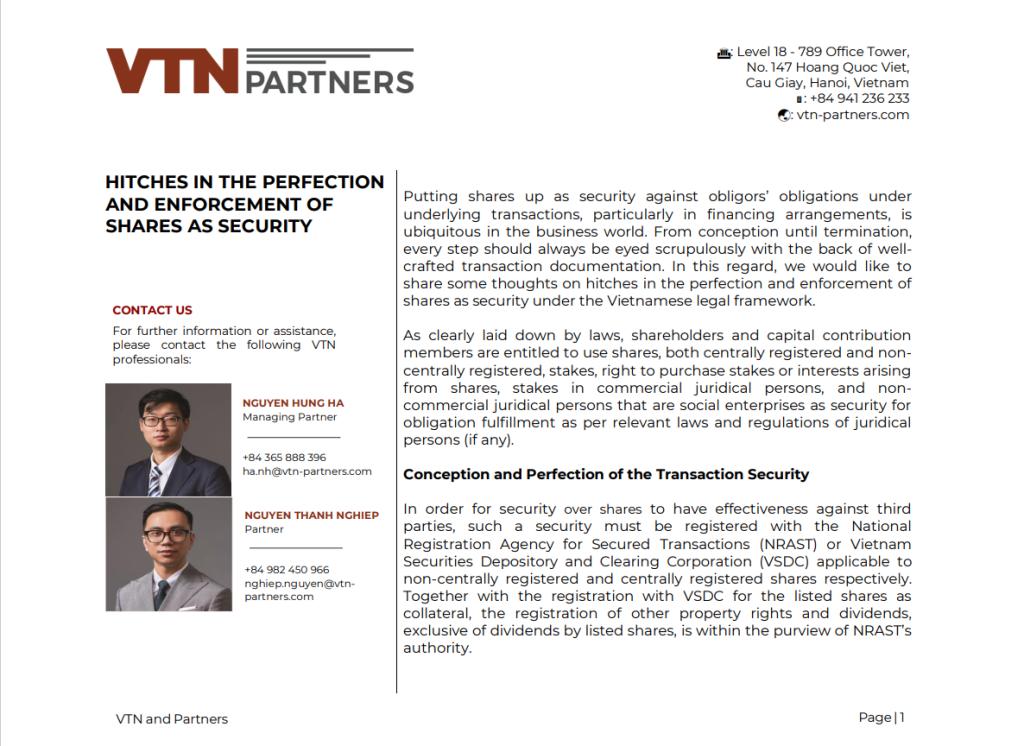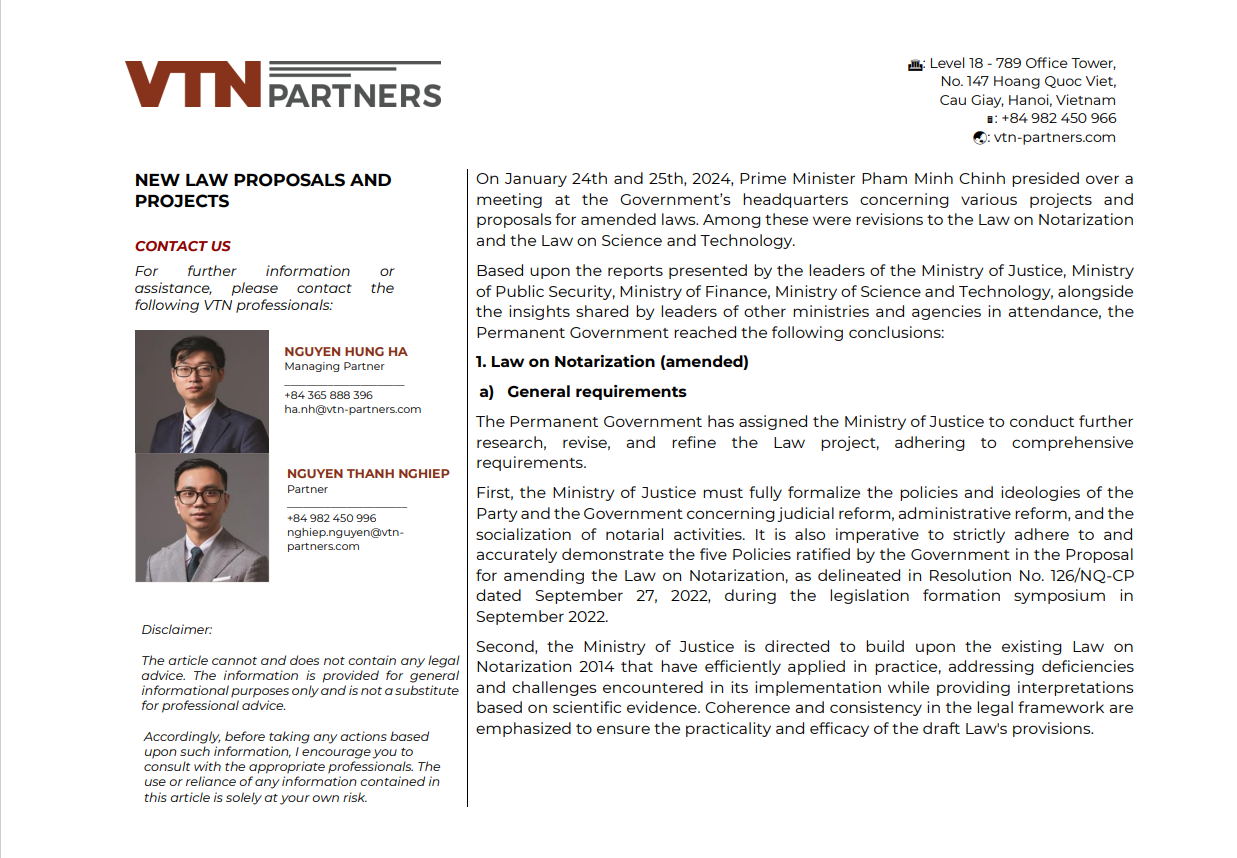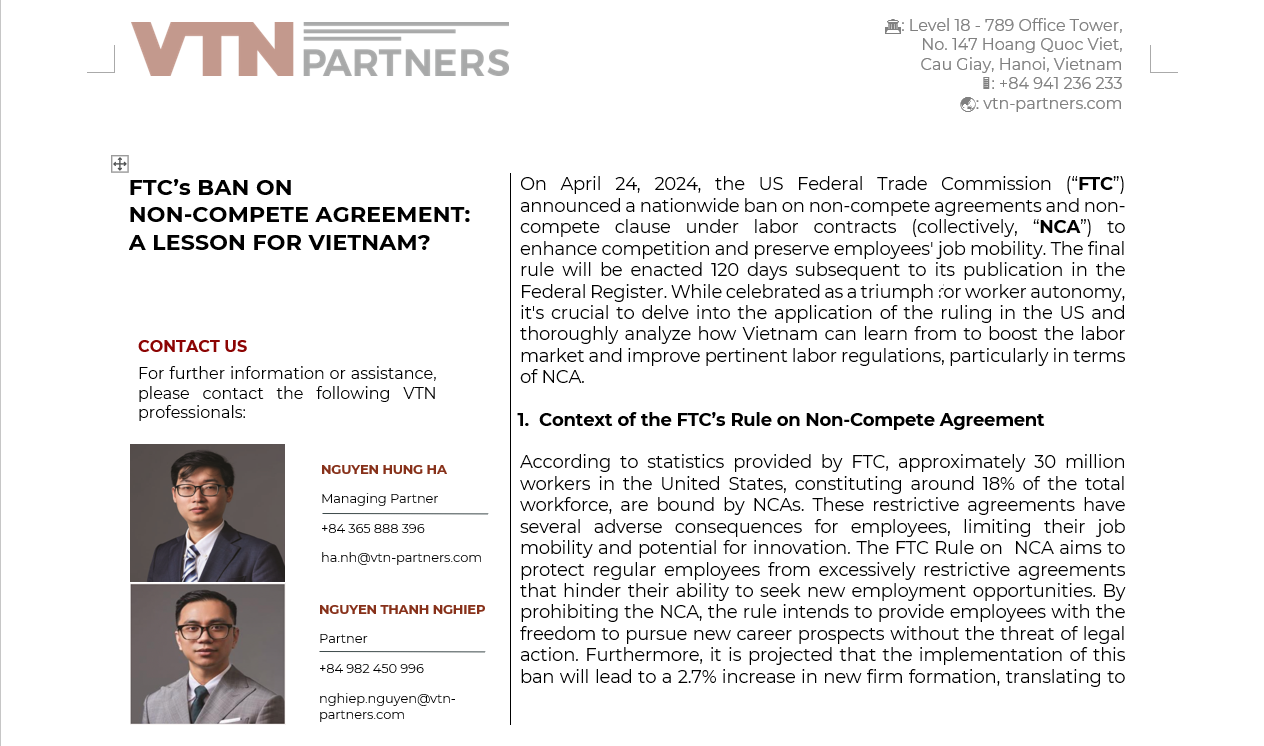Putting shares up as security against obligors’ obligations under underlying transactions, particularly in financing arrangements, is ubiquitous in the business world. From conception until termination, every step should always be eyed scrupulously with the back of well-crafted transaction documentation. In this regard, we would like to share some thoughts on hitches in the perfection and enforcement of shares as security under the Vietnamese legal framework.
As clearly laid down by laws, shareholders and capital contribution members are entitled to use shares, both centrally registered and non-centrally registered, stakes, right to purchase stakes or interests arising from shares, stakes in commercial juridical persons, and non-commercial juridical persons that are social enterprises as security for obligation fulfillment as per relevant laws and regulations of juridical persons (if any).
Conception and Perfection of the Transaction Security
In order for security over shares to have effectiveness against third parties, such a security must be registered with the National Registration Agency for Secured Transactions (NRAST) or Vietnam Securities Depository and Clearing Corporation (VSDC) applicable to non-centrally registered and centrally registered shares respectively. Together with the registration with VSDC for the listed shares as collateral, the registration of other property rights and dividends, exclusive of dividends by listed shares, is within the purview of NRAST’s authority.
Given the same secured parties, on account of the transition back and forth between non-centrally registered and centrally registered shares, the shares will be first registered with one registrar and then upon its deregistration/ cancellation or registration, the shares must be registered with the other registrar for its third-party effectiveness.
Besides, with regard to the centrally registered shares, for perfection, the shares must be locked in a specialized securities account for the transaction security in accordance with Decision 21/QD-HDTV dated August 10, 2023, by VSDC. This procedure must be assisted by depository members being securities firms and licensed banks.
The perfection evidence should be the confirmation by VSDC and/or NRAST on the registration of security interests.
The effectiveness against third parties during the unregistered transition period is still in question as in reality the administrative procedures may take some time to complete. In addition, regardless of the listing status of shares, from a Vietnamese law perspective no principles for re-registration in case of changing the exchange, e.g. from Hanoi Stock Exchange to Ho Chi Minh Stock Exchange, but in practice, this is questionable due to the unsureness of VSDC about the system.
Enforcement of Shares as Collateral
Before the realization of any transaction security, shares in particular, the secured parties are required to inform the securing parties of the enforcement no later than 10 days prior to the estimated enforcement date (a 15-day timeframe uniquely applicable to immovable assets). For the listed shares, only a notice before its sale is requisite. In either case, the foreign ownership limit must be taken into consideration and cleared up before realization procedures.
Methods of exercising the enforcement of shares as collateral include the auction of shares, direct sale of shares, collection of those shares, or other methods as agreed by the parties in writing. In many transactions, the parties agree on all of the methods with priority of choice.
Yet, regarding the enforcement of the non-centrally registered shares, there is a score of documents on which the signatures of the mortgagor’s authorized representatives are compulsory, then the cooperation of the mortgagor is needed. Otherwise, the dispute will be resolved by the agreed dispute resolution body. The hitch here is that Enterprise Law does have a provision on the amendment of company registration information in accordance with court judgments and arbitral awards, even so, its guiding decree – Decree No. 01/2021/ND-CP, Investment Law and guiding regulations are not well defined in this case.
In respect of the centrally registered shares, the transfer of shares to the mortgagee or third parties shall be made without the intervention of the mortgagor given it is specified under the security agreements. Despite that, the lack of guidance on continuous trading of the centrally registered shares as collateral results in the enforcement process being stuck.
Even though the Official Letter No. 7917/UBCK-PTTT of the State Securities Commission dated November 30, 2021, and the Announcement No. 366/TB-TC of the General Department of Civil Judgment Enforcement dated December 10, 2021 guide that “to implement the transaction through the stock exchange system, the civil judgment enforcement agency must complete the procedure of transferring the ownership of securities from the debtor to the enforcement agency. Afterward, the enforcement agency will conduct the sale of the listed shares based on the actual situation on the transaction date.” and “no need to carry out valuation procedures when selling securities by this method”, this means that there must be a judgment or arbitral award to be “enforced”.
#financing #security #shares #Vietnam #law #VTN








